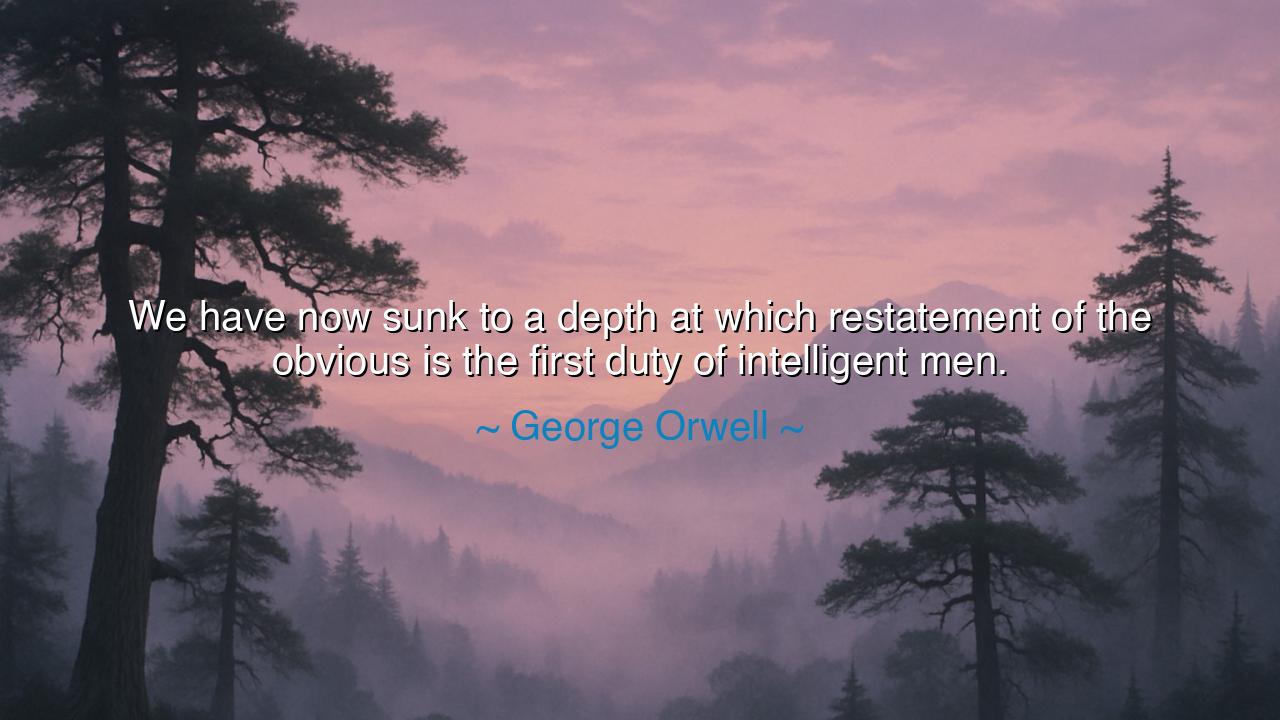
We have now sunk to a depth at which restatement of the obvious
We have now sunk to a depth at which restatement of the obvious is the first duty of intelligent men.






In a time shadowed by deceit and distortion, George Orwell, the guardian of clarity and truth, wrote with bitter irony: “We have now sunk to a depth at which restatement of the obvious is the first duty of intelligent men.” These words are both lament and command—a cry from a thinker who saw civilization drowning not in ignorance, but in deliberate confusion. For Orwell, the tragedy of his age was not that men did not know the truth, but that they no longer dared to speak it. The obvious, that which should be plain to every honest mind, had been buried beneath propaganda, cowardice, and the comfort of denial. In such an age, to speak the simple truth became an act of moral heroism.
The origin of this quote lies in the essay “The Freedom of the Press,” written as a preface to Animal Farm in 1945 but withheld during Orwell’s lifetime. The essay reflects his horror at how easily truth can be silenced, even in so-called free societies. He wrote it after witnessing the moral collapse of his own generation—men and women who once prized truth but learned instead to twist it for ideology, to rename evil as good, and to sacrifice honesty for belonging. Orwell, who had fought fascism in Spain and denounced totalitarianism in all its forms, saw that language itself had become a battlefield. When lies became the common tongue, the restatement of the obvious—that two and two make four, that freedom is better than slavery—became a revolutionary act.
To restate the obvious is not to repeat the trivial; it is to defend the foundation of reason itself. The intelligent man, as Orwell saw him, must become a watchman of reality—guarding it against those who would distort it for power. Truth, once self-evident, becomes fragile in an age of manipulation. When the masses are trained to forget what is plain before their eyes, when words are emptied of meaning, and when moral clarity is mocked as simplicity, the duty of the wise is to speak plainly, even at the cost of ridicule or persecution. To speak the obvious in such times is an act of defiance; it is to light a candle against the gathering dark.
History offers us a grim mirror of Orwell’s warning. Consider the Soviet Union under Stalin, where millions perished while official reports proclaimed prosperity and progress. To say aloud that people were starving, that the system had failed, was to risk one’s life. Yet a few voices—writers, exiles, and dissidents—still dared to name the truth. Men like Aleksandr Solzhenitsyn, who later wrote The Gulag Archipelago, fulfilled Orwell’s command centuries apart: they restated the obvious, refusing to let truth be strangled by ideology. In doing so, they reminded the world that even when truth is outlawed, it remains undefeated within the conscience of the brave.
But Orwell’s words were not meant only for dictatorships. He spoke also to the subtler corruption of truth in democratic societies—the polite lies, the fashionable silences, the fear of offending. In every age, he saw the danger of comfort breeding apathy. When people cease to care about truth, when convenience replaces conscience, civilization begins to rot from within. The duty of the intelligent man—the thinker, the writer, the citizen—is to resist this decay by holding fast to reality, however unfashionable it may become. The world may call it naïve to say that cruelty is evil, that liberty is sacred, that honesty is nonnegotiable—but these “obvious” truths are the pillars without which no society can stand.
To live by Orwell’s teaching is to practice intellectual courage. It is to test every word, every belief, every headline against the standard of reality. It is to ask, “Is this true?” even when others hiss that the question itself is dangerous. It is to defend reason against emotion, conscience against convenience, and reality against the seductions of comfort. The intelligent do not merely know—they speak, they write, they act. They refuse to let the obvious die in silence.
The lesson, my children of truth and thought, is as urgent now as in Orwell’s day: guard the obvious. Do not let the plain truths of life—honesty, freedom, compassion, reason—be buried beneath fashion or fear. Speak clearly when others speak in riddles. Stand firm when others twist words into chains. Remember that civilizations are not destroyed by ignorance, but by the cowardice of those who know better and stay silent.
So, let your mind be clear, and your tongue bold. Restate the obvious, even if the world mocks you. For when confusion reigns and falsehood wears the mask of virtue, the repetition of truth becomes the last act of rebellion—and the first step toward renewal.






AAdministratorAdministrator
Welcome, honored guests. Please leave a comment, we will respond soon